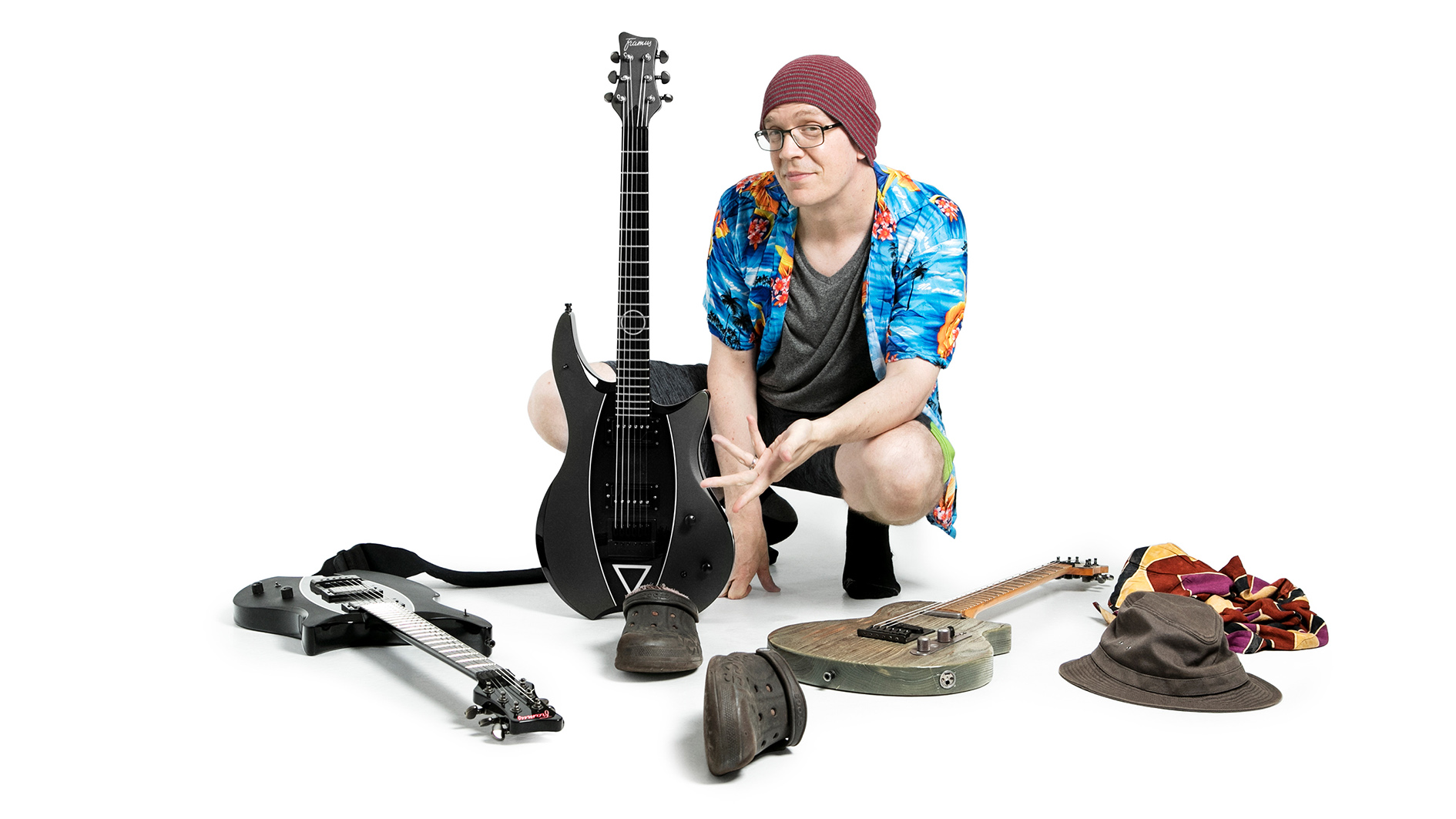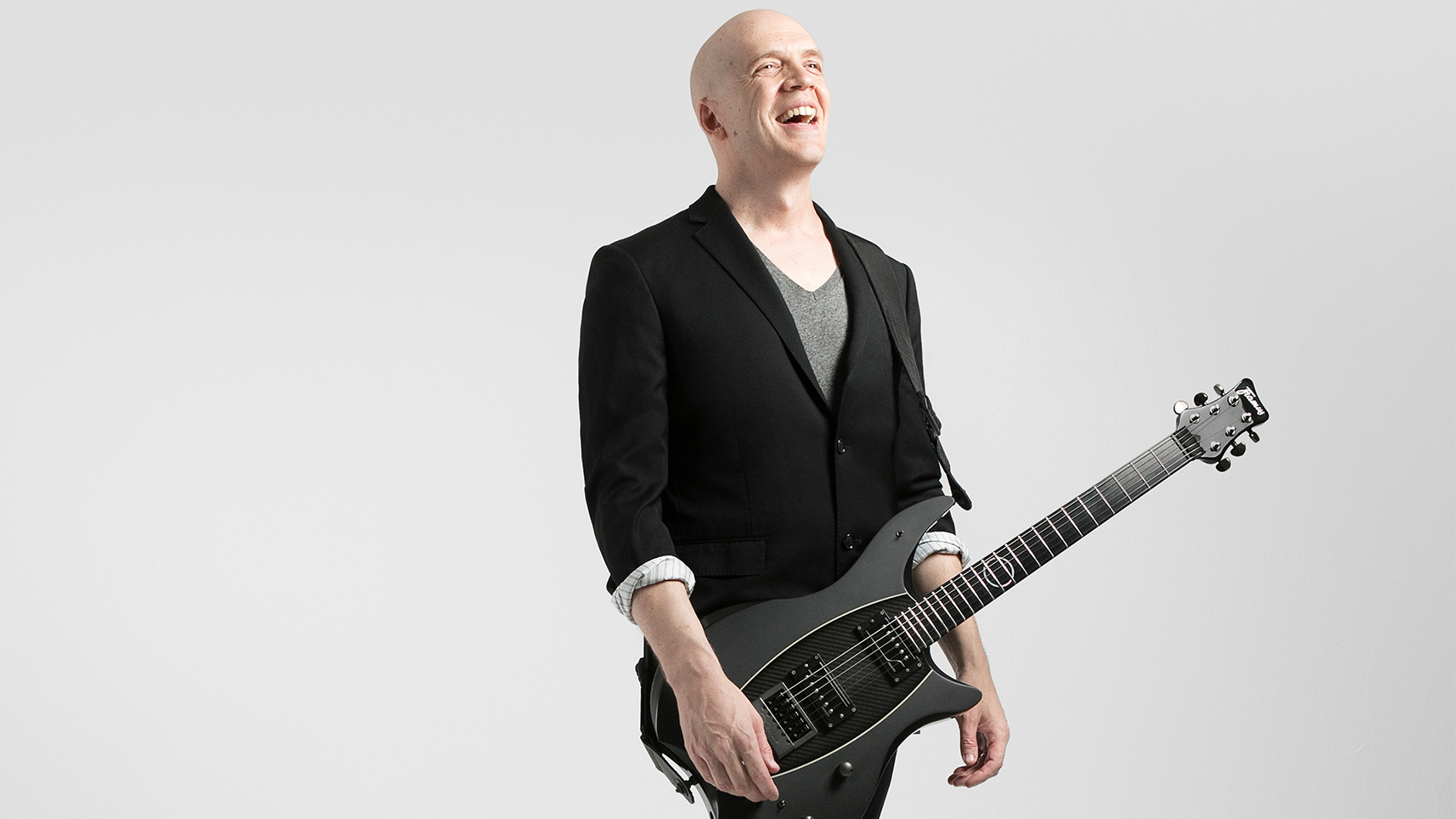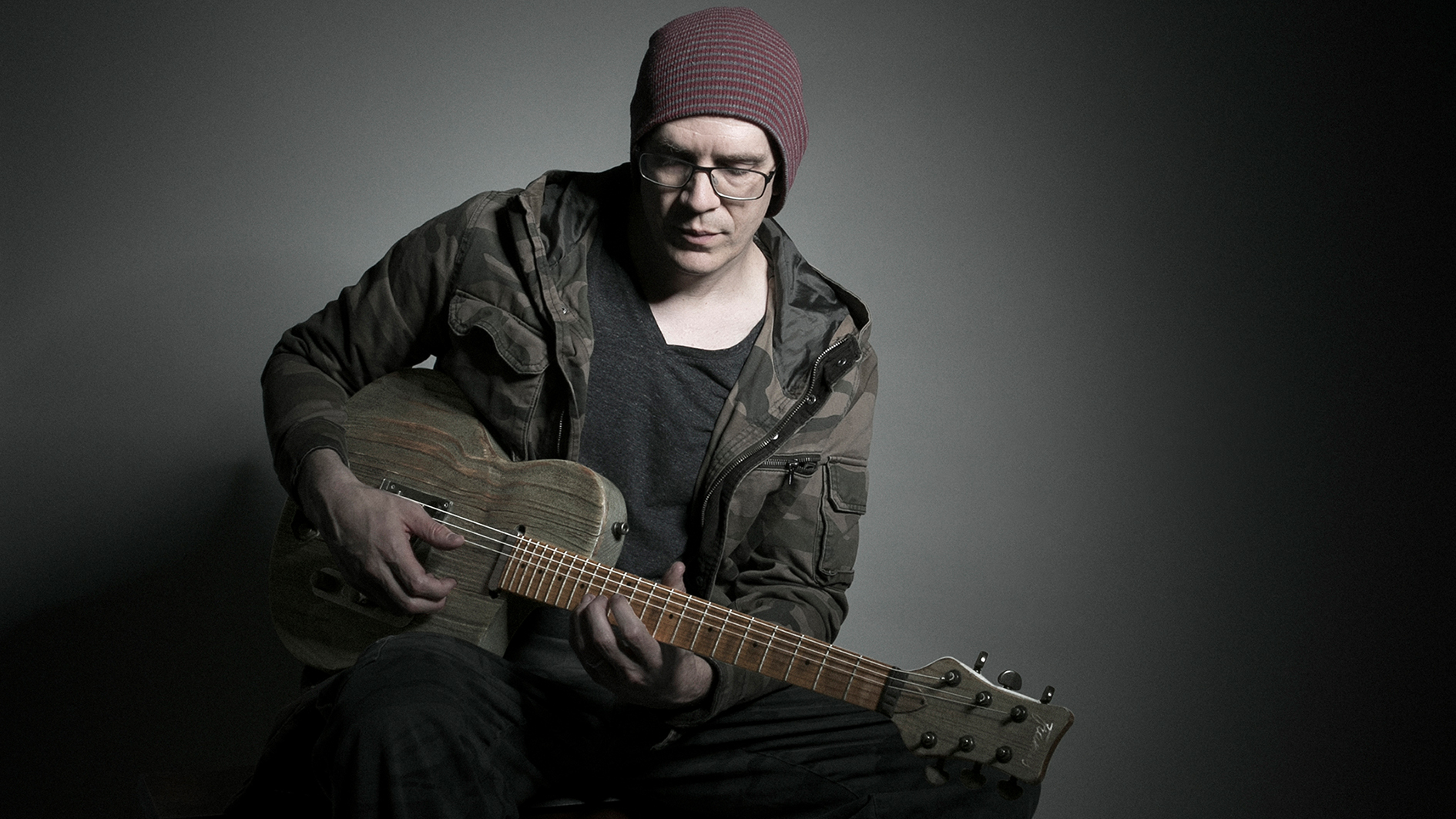Devin Townsend on finding his perfect guitar rig, the key to great improv and the guitarist who changed everything for him
Ahead of his Empath Europe Volume 1 Tour, Hevy Devy reflects on performing live and in the moment with no safety net

Devin Townsend is doing just fine but he sure is having a lot of trouble sleeping. It’s the work. “There is so much going on, and it’s such an intense and exciting moment that I just, I just can’t fall asleep!” he laughs.
Right now Townsend has a lot on. He’s holed up in Bolton, a former textiles town in northwest England, where rehearsals are underway for his forthcoming Empath Europe Volume 1 Tour, which opens Thursday, November 15th.
If he is not rehearsing, tethered to his electric guitar, he is on the treadmill (the only place he listens to metal these days), or he is on the phone, trying to explain why this tour is going to be such a big deal.
The Empath tour sees Townsend put together a new live lineup that includes Morgan Ågren on drums, Mike Keneally and Markus Reuter on guitar, Diego Tejeida on keyboards, Ché Aimee Dorval on vocals/guitars, Nathan Navarro on bass- plus a three-piece choir comprising Samantha and Anne Preis, and Arabella Packford.
It’s a tour that will see Townsend’s band play without click-tracks or backing tracks, with the intention that there will be room for improv.
“This is where I am at right now,” he says. “Sometimes where I am it is just an acoustic thing, just me and an acoustic guitar. And so when I am in a moment like that, in a certain way I am thankful for it, because it’s a lot easier! [Laughs] But this is where I am at right now. It seems to require a lot of people and a lot of production, and a lot of gear, and a lot of [coughs] notes!”

As Townsend explains here, the idea is each night will be different. There are spaces in the setlist where each member of the band starts the jam, and where the jam takes them Townsend can’t be 100 per cent sure.
Get The Pick Newsletter
All the latest guitar news, interviews, lessons, reviews, deals and more, direct to your inbox!
“As opposed to trying to replicate the record exactly, you use this skill set of the people you have involved to make it something that isn’t the record,” says Townsend.
“Because if you want to hear the record, you’ve got the record. I am starting to realize that this kind of freedom in a live format is really where a lot of magic lies, and maybe that’s what I needed to learn out of this.”
Has this tour made you rethink your rig, or is yours sort of pack-up-’n’-play no matter the occasion?
“I have obsessed about my gear for as long as I have been playing and I have finally decided that the Axe-Fx III - a single Axe-Fx III and one as a redundancy - with the FC12 [foot controller] and a single expression pedal is almost without question a perfect rig for me.
“I have now made my own cab sims. I work really closely with Fractal, and have everything that I wanted it to do throughout all my career: the patch changes, the spillovers, different tones, effects, routing, having consistent sound, having something I can travel with, having something that’s modular, having something that I can have a reliable backup for, powering my pedalboard without an external power. I just realized over the past six months that this is perfect; this is what I want.
The nature of the recorded material is that it is hundreds of tracks, so I have to scale the arrangements back tenfold just to make it function
“And it has been very liberating for me after years of assuming that all I needed to do was find a better amp, purchasing some old, crusty, brown-faced Princeton thinking that it is going to get me to that place that I have been dreaming of. It gives me all those tools and I am perfectly happy.”
Do you not have suffer from option paralysis?
“I am very good with options, because I think after having kids it has made it a lot easier for me to commit and move on.
"I mean, these are not real problems now. Maybe at one point it was. Like, ‘I don’t know whether this one with the tungsten-dipped kafuffle-buffer has the creamier high-end than this other one.’”
Will you have to change the arrangements to make Empath work live?
“Absolutely, yeah, because we are not using backing tracks or click-tracks or anything.
"The nature of the recorded material is that it is hundreds of tracks, so I have to scale the arrangements back tenfold just to make it function, but that being said, it offers some unique opportunities, specifically with this line-up, of really enjoying and actively pursuing different arrangements."
“For years I have always been under the assumption that when people go to see a show you want to replicate it, so that it sounds like the record. But what I started realizing towards the end of the last band I was in was that, after a while, it’s not really a performance; it’s almost like pantomime.
"It’s almost like you are doing a karaoke version of what you are doing. Sometimes the most memorable moments from these shows is when things fuck up! [Laughs]
"Y’know, right? When things go south and you kinda have to improvise your way through it, and so I tried to view this first tour, that we are just about to start here, through that lens.”
And in if there’s a unique performance each night, it makes it all the more essential to actually be there, to live in the moment.
“So true. So true, man. It’s like every night is something unique, right? Every night on the setlist a certain member’s name is listed and they start the jam. I like the idea that everybody whose turn it is goes out of their way to try and surprise the others, and then you just follow and you just see what happens.
"And there is an in-point and an out-point but, in the meantime, some of the stuff that occurs is just so beautiful, and so unique, that if we had tried to arrange any of that stuff it would just be flat.”
It’s like you are embracing the freedom to rewrite the songs in real-time.
“There is a certain amount that has to be adhered to structurally, because there are so many people, and the arrangements of the songs tend to be pretty complicated in the first place. But as I grow as a musician and as a person, the thing that allows improvisation to be like a real part of your vocabulary is the ability to let things go.
“I think a lot of folks, including myself specifically - up until recently - my fear of making mistakes, because I am such a perfectionist when it comes to the work, would lead me to make mistakes.

“It’s like I am so concerned about screwing up that I just inevitably screw up, so part of the whole process of improvisation is, ‘Don’t hold onto it. Don’t record it. Don’t worry about it. If you screw up, make that screw up a new key or something.’
“And that has become really interesting, like in order to do it efficiently you can’t be fascinated by it in a way, and I find that really, really healthy.”
It’s difficult to improvise when we are preoccupied with perfection.
“On this run, I have proactively tried to find musicians who are improvisational, and musicians that have a certain freedom to their sensibility, so that when we all come together, not only does that sort of lack of preciousness seem to occur, but also everybody seems to be confident enough that it is not like eight people playing at the same time. [Laughs]
As I get older I am starting to think, ‘Well, the best player is the one who just listens and plays what the song needs
"You know what I mean!? It’s like you are listening to it and it’s like, ‘Oh, that’s cool. That doesn’t need me so I am not going to do anything.’ As opposed to, ‘What he is doing is very interesting so what I need to do is put a solo on top of it.’”
With so many players on the stage, and giving those permissions for improvising, it heightens your appreciation of space in an arrangement.
“Mm-hmm. I think any of us, if you are listening to music with a listening ear as opposed to a ‘I want to be seen as a great player’ ear, a lot of times it’s just about filling in the gaps.
"Like, ‘OK, what’s going on in this cloud of sound here? What does it need?’ Maybe it only needs a single note every four bars for your contribution, to make it better, and for you to actually be contributing to it, and I think a lot of times the intimidation tends to come from this sense of, ‘All these players are fantastic. I am not good enough to be with them.’ Whereas, I think anybody is good enough to play with anybody, if you are listening.”
Definitely. It’s always best to play with the best musicians possible. Invariably they will elevate your playing.
“Well the drummer, Morgan, who is basically my favorite drummer, ever, we first played together on this Casualties of Cool project, and the reason why I wanted him - he’s been with everyone, Zappa, Magma, Crimson, all these big, heavy cats - was because he is as good as he is, when he heard the Casualties’ music he said, ‘Oh, what it needs is a train beat. It doesn’t need a solo; it needs that.’
“And I think that there is a misconception, or at least there has been for me, as to what constitutes a great player, because when I was younger I used to think the great player was the guy who could play precise 64th-note arpeggios.
"But as I get older I am starting to think, ‘Well, the best player is the one who just listens and plays what the song needs.’ If you are with great players, eventually you are going to just make great music, because no-one is doing something absurd just for the sake of it.”
The best players play on the best songs and make the best music.
“Totally. I mean, you listen to the rhythm section of U2, for example, who play very simple bass and drums, but it is super-tight, super-groovy, and it’s great. And it doesn’t need more than that.
"I remember hearing someone talking about the bass player in Neil Young’s band years ago, and they said he was such a great bass player because all he did was change the pitch of the kick drum. It is about music, I guess. I mean, obviously! [Laughs]"
As a rule, the electric guitar needs accompaniment, and so it’s vital it finds its place in the mix. Is that something that you have always been conscious of? It’s like you are always reevaluating your playing and where it fits.
“Well, hearing it put like that, I guess the answer is yes. But it made me think while you were asking it what my connection to the guitar is in the first place. The guitar is just an extension of my trip, right?
"I am fortunate that I still have the ability to move my fingers, and stand, and all these things I am really thankful for obviously, because throughout my life the guitar has sort of accompanied me, and by me reevaluating where the guitar fits in the music I think that’s actually a by-product of me just evaluating where I fit in the music.
As long you’ve got your mind around who you are then it’s just about following that with conviction
“The guitar is kind of an analogy for my trip, and when I was younger it was a tool. It was just like a hammer. And I would just use it to actualize these ideas, but then over the past five or six years, when I realized, that - holy shit! - I’ve been playing this thing for 35 years, and all those hang-ups that I have had about it in the past, like I am not a great alternate picker, I don’t use my pinky enough...
"All these sorts of things, things that used to make me feel poorly about myself, recently I see it and think, ‘No. That’s who you are.’ I don’t use my pinky a lot. And I like a ton of echo. Like all these things I’ve maybe felt insecure about in the past while I just recently thought, ‘Ah! That’s my trip. That’s who I am.’”
Guitarists get insecure about the craziest things.
“Yeah, I think that once you are at a point finding that you are comfortable with who you are, and whether or not that offends people or whether people like the idea, I mean, as long you’ve got your mind around who you are then it’s just about following that with conviction.”
Again, the pursuit of perfection can get in the way.
“I was just on the treadmill a couple of minutes back, and decided to listen to old Judas Priest. It’s been years. When I was a kid I just loved that band. I mean the really old ‘70s version of the band.
"And I realized when I was listening - I was listening to Unleashed in the East - and KK Downing was probably the biggest influence for me because it was all out of tune. And I don’t mean out of tune in that his chords were out of tune; it was the random guitar solos with the whammy bar that was totally out of tune.
“It was microtonal, whammy bar oddness, and I realize as I am playing now, I love that microtonal thing, even though in my world, and in my work, it’s gotten more progressive or orchestral, but that out-of-the-box tonality is something that I just love, and so, when I solo now I always go to that.
"I’ll be in the box for a couple of seconds and then I just wanna find those notes that are messed up, and then make them more messed up... And then put a ton of echo on them so it sounds deliberate! [Laughs]”
Unleashed in the East gets a lot of grief for the overdubs but they left all that microtonal animalism in there and it sounds amazing. It makes it feel alive and dangerous.
“Yeah, and you know what’s funny, I was actually thinking about what you just said when I was listening to it, about all the shit that they got for doing the overdubs.
"But on a practical level, I think it sounds great, so how much of the fact that it is overdubbed a problem just because of the fact that people think that they are not doing it correctly? Like, 'That’s not how you should do it!' But that has got nothing to do with my personal experience with that album.
“I liked how it sounded. I liked how the vocals sound - the vocals are great. In fact, I am really glad that his vocals were in tune on that because it was really inspiring to me as a kid.
"If it had been the original recording, where maybe he was all out of tune and missing words or what have you... There are certain records like that. I like to listen to music on the treadmill and the day before I listened to another one of my favorite live records which is by a band from California called Fear, from early ‘80s, and the album is called Fear: Live… For the Record, and that is just completely live.
"What makes that so good is that is terrible! Everything’s bad! But it just had such character that, for that, it was great.”
"I’ll be in the box for a couple of seconds and then I just wanna find those notes that are messed up, and then make them more messed up. And then put a ton of echo on them so it sounds deliberate! [Laughs]”
Devin Townsend’s Empath Europe Volume 1 Tour kicks off on November 15th, in Paris, France. See HevyDevy.com for worldwide dates.
Jonathan Horsley has been writing about guitars since 2005, playing them since 1990, and regularly contributes to publications including Guitar World, MusicRadar and Total Guitar. He uses Jazz III nylon picks, 10s during the week, 9s at the weekend, and shamefully still struggles with rhythm figure one of Van Halen’s Panama.
Ozzy Osbourne’s solo band has long been a proving ground for metal’s most outstanding players. From Randy Rhoads to Zakk Wylde, via Brad Gillis and Gus G, here are all the players – and nearly players – in the Osbourne saga
“I could be blazing on Instagram, and there'll still be comments like, ‘You'll never be Richie’”: The recent Bon Jovi documentary helped guitarist Phil X win over even more of the band's fans – but he still deals with some naysayers











